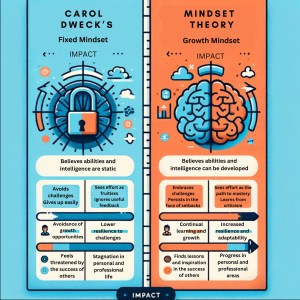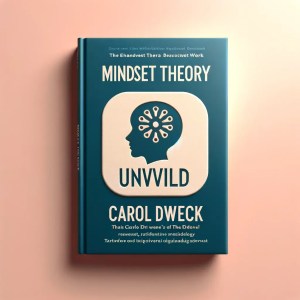- Introduction to How Mindset Works
- Understanding Proving vs. Improving Mindset
- The Growth vs. Fixed Mindset Paradigm
- Unraveling Carol Dweck’s Mindset Theory
- Transformability of Mindset
- Practical Strategies for Changing Mindsets
- Mindset’s Impact on Professional Growth
- The Power of a Growth Mindset
- Fixed vs. Growth Mindset in the Workplace
- Real-life Corporate Examples
- Practical Steps to Foster a Growth Mindset
- Mindset and Its Impact on Personal Well-being
- Conclusion: Embarking on the Mindset Evolution
Introduction to How Mindset Works
Navigating Mindset: The Journey from Proving to Improving
Discover Your Path
Have you ever stood at a crossroads, torn between the comfort of what you know and the allure of what you could become?
Welcome to the battlefield of mindsets.

Unlocking Growth Through Mindset Transformation
In the intricate landscape of human psychology, ‘mindset’ is a pivotal thread shaping how we navigate life’s challenges and opportunities. Can a mindset change? This question unlocks our potential for growth.
In this article, we delve into ‘proving’ and ‘improving’ mindsets, inspired by Carol Dweck’s growth vs. fixed mindset concept. We dissect these mindsets, discuss practical transformation, and examine their impact on careers and well-being.
Join us on this captivating journey as we explore the ‘proving mindset,’ ‘improving mindset,’ the process of changing your mindset, and how it impacts your life. Whether you’re aiming for career growth, academic success, or personal development, these insights have the potential to transform your journey.
Discover the transformative power of mindsets and how shifting perspective can unleash boundless potential in your life.
Understanding Proving vs. Improving Mindset
The Proving Mindset: Focused on Performance
The Proving Mindset: The Stage of Self-Validation
In the world of personal and professional growth, the proving mindset plays a significant role. This mindset is all about showcasing and validating one’s abilities, similar to a performer on a stage. It’s not necessarily about improving but more about affirming self-worth and impressing others.
For example, let’s meet John, a seasoned software engineer. He consistently took on projects within his comfort zone, avoiding new technologies that might reveal his lack of experience. While this approach felt safe, it ultimately limited his professional growth.
The proving mindset often has roots in deeper psychological factors like a fear of failure or a strong need for external validation. Success is often defined by others’ opinions rather than personal development.
People with this mindset tend to avoid challenging tasks and gravitate towards those where success is guaranteed. They prefer to stay within their comfort zone to protect their established skills.
In the workplace, this mindset leads to choosing simpler tasks over more complex ones, potentially hindering professional growth. Feedback, crucial for development, may be resisted, as it could highlight imperfections in their polished facade.
The Improving Mindset: Embracing Growth
The Improving Mindset: Embracing Growth and Learning
In stark contrast to the proving mindset, the improving mindset is all about embracing growth and learning. It’s like a river, always in motion, believing that abilities can evolve through effort and persistence.
People with an improving mindset don’t just venture out of their comfort zones; they live outside of them. They view challenges as opportunities for growth, not threats. Feedback isn’t a weapon but a tool for self-improvement. This mindset not only allows for personal and professional growth but actively encourages it.
In the workplace, the improving mindset fosters a dynamic and resilient culture. It promotes collaboration and a commitment to continuous learning, creating an environment where innovation and progress are the norm.
To cultivate this mindset, consider incorporating daily practices like setting personal growth goals, actively seeking constructive feedback, and reflecting on daily opportunities for learning.
Mindset in Practice: Proving vs. Improving

Real-World Applications: Proving vs. Improving Mindsets
The real-world application of these mindsets is vividly apparent in various professional scenarios. Case studies across industries demonstrate how a proving or improving mindset can influence decision-making, teamwork, and leadership. The choice between these mindsets is not just a personal predilection; it’s a determinant of one’s career trajectory, job satisfaction, and overall sense of fulfillment.
For instance, a study in a tech startup showed how shifting from a proving to an improving mindset led to a 30% increase in innovation and a significant boost in employee satisfaction.
Self-Reflection: Identifying Your Mindset
Discovering Your Dominant Mindset
But how does one discern which mindset predominates in their professional life? This calls for a journey inward. It’s about introspection, a self-assessment to determine whether your natural inclination is towards proving or improving.
The significance of this self-awareness in one’s mindset cannot be overstated.
Recognizing your dominant mindset is the first step towards a possible shift, steering you towards a path of continual growth and development. It’s about understanding where you are to map out where you could be, transforming not just your professional journey but your personal narrative as well.
To determine your dominant mindset, ask yourself: ‘How do I react to challenging situations?’ and ‘What drives my decision-making: fear of failure or potential for growth?’ Reflect on these questions to gain deeper self-awareness. You can also take this quiz:
Self-Assessment Quiz: Discovering Your Dominant Mindset
Instructions: Reflect on each question below and choose the option that resonates most with your typical responses or feelings. Be as honest as possible with your answers to get an accurate assessment.
The Growth vs. Fixed Mindset Paradigm

Unraveling Carol Dweck's Mindset Theory
The Power of Mindsets: Growth vs. Fixed
Renowned psychologist Carol Dweck's groundbreaking research on mindsets simplifies the complex concept of personal development. She categorizes mindset into two types: 'growth' and 'fixed.'
A 'growth' mindset sees abilities as skills that can be developed through effort. On the other hand, a 'fixed' mindset views abilities as unchangeable traits you're born with.
Characteristics of Fixed and Growth Mindsets
The Fixed Mindset: Embracing the Status Quo
Individuals with a fixed mindset view talent and intelligence as inborn traits, akin to genetic endowments. This perspective often leads to shying away from challenges, feeling threatened by others' success, and considering effort as somewhat pointless if one is not "naturally gifted."
The Growth Mindset: Nurturing Potential and Resilience
On the flip side, the growth mindset is characterized by an enduring belief in the malleability of one's abilities. People with this mindset embrace challenges, perceive failures as valuable learning experiences, and find inspiration in the accomplishments of others.
Mindset and Its Influence on Behavior
The Limitations of a Fixed Mindset
A fixed mindset can significantly impede personal growth. It often fosters a fear of failure and a reluctance to engage in tasks that might challenge one's self-perception of intelligence or talent.
The Benefits of a Growth Mindset
In contrast, a growth mindset is conducive to resilience and a lifelong passion for learning. It enables individuals to adapt and thrive amidst challenges and changes, fostering a mindset of exploration and continual development.
Mindset in Action: Professional and Academic Impact

Professional Implications: Mindsets in the Workplace
These mindsets have profound implications in the workplace. A fixed mindset might limit one's career advancement and openness to new opportunities, while a growth mindset can enhance performance, foster innovation, and facilitate career development.
Academic Relevance: Mindsets in Education
In educational settings, these mindsets play a critical role in shaping students' approach to learning, affecting their academic achievements and their overall attitude towards education.
Everyday Manifestations of Mindset
Real-World Scenarios: Mindsets in Everyday Life
Mindsets manifest in everyday decisions, problem-solving approaches, and interactions. Whether it's how one responds to feedback, tackles a complex problem, or perceives others' successes, mindsets subtly but significantly influence our daily lives.
Recognizing Mindset Traits: Self-Discovery and Insight
Recognizing one's own mindset can be insightful. It involves observing one's reactions to feedback, approach to challenges, and perception of others' achievements.
Transitioning from Fixed to Growth Mindset
Changeability of Mindset: Embracing Growth
Dweck's theory emphasizes that mindsets are not static. The brain's neuroplasticity allows for the development of a growth mindset, even for those who have long held a fixed mindset.
Practical Mindset-Shifting Strategies: Embrace Growth
To cultivate a growth mindset, one can embrace learning opportunities, reframe setbacks as growth experiences, and engage in reflective practices. It's about shifting the focus from proving oneself to improving oneself.
Transformability of Mindset

Exploring the Malleability of Mindset
The Dynamic Nature of Mindset Transformation
The concept of mindset transformation hinges on the dynamic and evolving nature of our mental frameworks. Contrary to the belief in a permanently fixed mindset, contemporary research underscores the fluidity and adaptability of our cognitive orientations. This revelation opens up a realm of possibilities for personal and professional development.
Scientific Evidence on Mindset Transformation
The Science Behind Mindset Transformation
The science behind mindset transformation is both fascinating and empowering. Studies in neuroplasticity and psychology provide compelling evidence that interventions can indeed foster a shift from a fixed to a growth mindset. These interventions range from targeted exercises to broader educational programs, each playing a pivotal role in reshaping our cognitive landscapes.
The Journey from Proving to Improving Mindset
Real-Life Success Stories of Mindsets in Action
To gain practical insights into the impact of mindsets in the workplace, let's examine real-life case studies that highlight the transformative potential of transitioning from a proving to an improving mindset. These stories serve as blueprints, showcasing the strategies employed and the remarkable outcomes achieved through a commitment to growth-oriented practices.
Drawing from Carol Dweck's research, we discover that employees in growth-mindset organizations exhibit significantly higher levels of engagement and collaboration. They're 47% more likely to trust their colleagues, fostering open communication and teamwork. Moreover, they demonstrate a 34% increase in commitment and ownership toward their company, aligning personal goals with organizational objectives—an indicator of an engaged workforce.
These organizations also have a 65% higher propensity to support risk-taking, creating an environment that not only encourages but celebrates innovative thinking—a crucial aspect in today's rapidly changing business landscape. Employees in growth-mindset companies report a 49% greater belief that their organization fosters innovation, nurturing creative problem-solving and market advancement.
Feedback, a cornerstone of the growth mindset, plays a significant role. An astonishing 93% of employees acknowledge the instrumental role of constructive feedback in improving their performance, emphasizing the importance of meaningful conversations for employee growth.
Case studies further reveal that when leaders provide growth-oriented feedback, the benefits extend beyond individual development to operational success. Organizations with such leadership experience a 14.9% reduction in turnover rates, indicating a more satisfied and stable workforce. Productivity surges by 12.5%, making operations more efficient and effective. Most notably, these companies achieve an 8.9% boost in profitability, underscoring the economic advantage of fostering a growth mindset.
These real-life examples and statistics illustrate a compelling narrative: organizations that invest in cultivating a growth mindset don't just enhance individual attitudes but also improve overall operational health and market positioning. The journey from proving to improving mindset is not merely a personal or professional aspiration—it's a strategic differentiator in today's fiercely competitive business world.
Role of Education and Training
Education and training play a crucial role in this transformative journey. Structured programs, whether in academic settings or professional development courses, have been shown to effectively facilitate the shift towards an improving mindset.
Practical Strategies for Changing Mindsets
Setting Small, Achievable Goals
Start by setting small, achievable goals that challenge your current abilities. Regularly track your progress and celebrate small wins to reinforce a growth mindset.
Self-Reflection and Awareness
The first step in changing one’s mindset is developing self-awareness. Begin by asking yourself daily: 'What challenges did I avoid today due to fear of failure?' or 'What new thing did I learn today?'
Techniques and Exercises for Growth
To cultivate a growth mindset, start a daily journal. Record moments where you embraced challenges and reflect on what you learned. Additionally, consider finding a mindset coach or joining a workshop that focuses on personal growth.
Overcoming Challenges in Mindset Shift

Addressing Common Obstacles
The path to mindset transformation is not without its hurdles. Recognizing and strategizing against common challenges, such as resistance to change or fear of failure, is essential for a successful transition.
Emphasizing Continuous Improvement
It’s important to view mindset development as an ongoing journey. Continual effort and adaptability are key to maintaining and nurturing a growth mindset.
The Role of External Support and Environment
Environmental Influences: Shaping Mindset
The environments in which we operate – be it our workplace, home, or social circles – significantly impact our mindset. Cultivating or seeking environments that endorse a growth mindset is crucial for sustainable change.
Leveraging Support Systems for Mindset Transformation
Utilizing support systems like mentors, coaches, and peer networks can be incredibly beneficial in facilitating mindset change. Engaging with these resources provides not just guidance but also the motivation and accountability necessary for enduring transformation.
Mindset's Impact on Professional Growth
Mindset's Role in Shaping Your Career
Your mindset plays a profound role in shaping your career journey. In the intricate world of professional development, your mindset weaves the fabric of success and satisfaction. Embracing a growth mindset unlocks a reservoir of potential, elevating your career achievements and personal contentment. It transforms challenges into steppingstones for advancement.
The Power of a Growth Mindset

A Growth Mindset: A Valuable Professional Asset
A growth mindset isn't just a personal trait; it's a valuable professional asset. It equips you with adaptability, an unquenchable thirst for learning, and resilience. These qualities are not only advantageous but crucial for career growth, especially in leadership roles. They define a professional attitude that embraces change and thrives on continuous improvement.
Fixed vs. Growth Mindset in the Workplace
Divergent Behaviors and Outcomes: Fixed vs. Growth Mindsets
The contrast between fixed and growth mindsets becomes evident in professional settings. While a fixed mindset may lead to a rigid approach to problem-solving, a fear of risk, and a preference for the status quo, a growth mindset fosters innovative problem-solving, resilience in the face of setbacks, and a collaborative spirit.
Real-life Corporate Examples
Real-World Success Stories of Growth Mindsets in Organizations
When delving into the corporate world, we uncover a myriad of case studies that vividly illustrate the benefits of a growth mindset culture. These stories not only highlight strategic transformations but also offer a lens into the enhanced performance and employee satisfaction that follows.
Cigna's Developmental Focus
Global health service leader Cigna prioritizes continuous growth and learning, creating an environment where employees feel valued and clear about their career paths, which has translated into higher engagement and job satisfaction.
Bristol Myers-Squibb's Learning Orientation
This pharmaceutical giant has embraced experimentation and learning, driving resilience and agility that are crucial in the complex healthcare sector.
Cultivating a Growth Mindset for Organizational Success
Strategies for Nurturing a Growth Mindset
For employees aspiring to nurture a growth mindset, the key lies in embracing challenges, actively seeking feedback, and prioritizing learning opportunities. These strategies are fundamental to personal and professional development.
Leadership's Role in Fostering a Growth Mindset
Leadership plays a pivotal role in shaping a growth mindset within teams and organizations. Effective leaders lead by example, offer constructive feedback, and champion a culture that values learning and growth.
Benefits of a Growth Mindset in Diverse Professional Settings

Versatility Across Industries
The utility of a growth mindset transcends industry boundaries. It's equally valuable in technology, healthcare, the arts, and beyond, driving innovation and excellence in diverse professional landscapes.
Adapting to Change and Future Trends
A growth mindset equips professionals and businesses to not just survive but thrive amidst industry evolution and technological advancements. It fosters a readiness to embrace and leverage change for continuous improvement.
Overcoming Fixed Mindset Barriers in Professional Environments
Identifying and Addressing Fixed Mindset Traits
Recognizing fixed mindset traits in oneself or within teams is the first step towards transformation. Strategies to address these traits include fostering open communication, encouraging risk-taking, and valuing the learning process over immediate success.
Encouraging a Shift Towards Growth
For organizations aiming to transition from a fixed to a growth mindset, actionable steps include implementing policy changes, investing in training programs, and creating a supportive and inclusive work culture that values experimentation and learning from failures.
Practical Steps to Foster a Growth Mindset
Embracing Challenges as Opportunities
Reframing Challenges: A crucial step in fostering a growth mindset is to reframe challenges as opportunities for growth. This perspective shift transforms daunting tasks into avenues for personal and professional development. Venturing beyond comfort zones becomes not just a strategy but a mantra for those seeking to expand their horizons.
Case Studies and Success Stories
Inspirational narratives abound in the corporate world, highlighting how embracing a growth mindset can lead to significant personal and professional advancement. These stories are not just motivational anecdotes; they are beacons that light the path toward realizing the transformative power of a growth mindset.
Microsoft's Shift to a Learning Culture: Under Satya Nadella's leadership, Microsoft has reinvigorated its corporate culture by emphasizing a growth mindset. Employees are encouraged to learn from each other and see failures not as setbacks but as vital steps in the learning process. This cultural shift has contributed to Microsoft's renewed success in the competitive tech industry.
Telenor's Embrace of Continuous Development: Telenor, a major European telecom company, has committed to supporting its workforce by fostering a culture that values stretch goals and continuous improvement. By embedding the growth mindset into their core values, Telenor has seen enhanced collaboration and innovation across the organization.
Each of these organizations, despite their diverse industries and unique business contexts, has demonstrated a commitment to the growth mindset principles. The results speak for themselves, not only in enhanced employee morale and engagement but also in tangible business outcomes like innovation, productivity, and profitability.
By studying these success stories, it becomes clear that the journey from a proving to an improving mindset is not just a theoretical ideal but a practical roadmap to corporate excellence and personal fulfillment.
The Power of Feedback in Mindset Development
A Constructive Approach to Feedback
Feedback, when approached constructively, is a powerful tool for improvement. It's vital to seek and utilize feedback not as a reflection of inadequacy but as a steppingstone towards betterment.
Feedback in a Professional Context
In the workplace, effective solicitation and application of feedback can be instrumental in enhancing skills and propelling career advancement. It's about turning critiques into a curriculum for growth.
Cultivating Curiosity and Lifelong Learning

Promoting a Learning Culture
Advocating for a continuous learning culture is key in nurturing a growth mindset. In an ever-changing world, adaptability and a commitment to learning are indispensable traits for both personal and professional success.
Resources and Tools for Learning
Providing a curated list of resources, such as online courses, workshops, and books, offers a practical pathway for individuals to expand their skillsets and deepen their knowledge.
Building Resilience and Overcoming Setbacks
Developing Resilience
Resilience is the bedrock of a growth mindset. It involves cultivating an ability to persevere, maintaining a positive outlook, and learning from failures. This approach transforms setbacks into springboards for future success.
Handling Failures Constructively
Strategies to constructively analyze and learn from failures can convert seemingly negative experiences into valuable lessons, paving the way for future triumphs.
Setting and Pursuing Growth Goals
Goal Setting Techniques
Effective goal setting is paramount in a growth mindset. Utilizing the SMART framework (Specific, Measurable, Achievable, Relevant, Time-bound) helps in formulating goals that are not just aspirational but attainable.
Tracking Progress and Celebrating Milestones
Monitoring progress and celebrating milestones reinforces the growth mindset. It's a process that acknowledges each step forward, no matter how small, as a victory in the journey of growth.
Encouraging a Growth Mindset in Others
Role Modeling and Mentorship
Promoting a growth mindset in others can be significantly influenced by mentorship and leading by example. This approach inspires and motivates others to adopt a similar mindset in their personal and professional lives.
Creating Supportive Environments
Establishing environments that encourage a growth mindset is crucial. This involves fostering positive communication, collaborative opportunities, and a culture of respect and encouragement, thereby creating a fertile ground for growth and development.
Mindset and Its Impact on Personal Well-being

The Interplay Between Mindset and Mental Health
Mindset and Stress Management
A growth mindset plays a pivotal role in managing stress and adversity. By framing challenges as opportunities for learning, individuals can mitigate the impact of stress and anxiety, paving the way for improved mental health. This perspective not only lessens the burden of adversity but also transforms it into a catalyst for personal development.
Fixed Mindset and Psychological Impacts
Conversely, a fixed mindset can adversely affect mental well-being. It often leads to heightened anxiety, an ingrained fear of failure, and a tendency to avoid challenges. This mindset can create a psychological barrier that hinders personal growth and exacerbates stress.
Mindset in Personal Relationships
Growth Mindset in Building Relationships
In the realm of personal relationships, a growth mindset fosters healthier, more resilient connections. It encourages open communication, empathy, and the acceptance of imperfections, both in oneself and in others. This mindset nurtures relationships grounded in understanding and mutual growth.
Overcoming Relationship Challenges
Different mindsets distinctly influence how one approaches relationship challenges and conflict resolution. A growth mindset promotes constructive approaches to these challenges, facilitating personal growth within relationships.
Mindset and Lifestyle Choices
Influence on Daily Habits and Decisions
The proving vs. improving mindset significantly impacts daily lifestyle choices, including health habits, financial decisions, and hobbies. These mindsets shape how one approaches day-to-day life, influencing decisions that cumulatively define one’s overall lifestyle.
Promoting a Balanced Lifestyle
Adopting a growth mindset can lead to a more balanced and fulfilling lifestyle. It emphasizes the integration of personal development into various life aspects, fostering a holistic approach to well-being.
Cultivating Well-being Through Mindset Practices
Mindfulness and Growth Mindset
Mindfulness is a powerful tool for cultivating a growth mindset. It encourages present-moment awareness and acceptance, which are essential for fostering a mindset oriented towards growth and development.
Practical Mindset Exercises for Well-being
To reinforce a growth mindset and enhance overall well-being, various exercises can be employed. These include gratitude journaling, meditation, and affirmations. These practices not only promote a growth mindset but also contribute significantly to one’s mental and emotional well-being.
Cultivating a Growth Mindset: Practical Strategies

Embrace a Growth Mindset with Actionable Steps
- 1. Embrace Challenges: See challenges as opportunities for growth. Tackle them head-on and embrace the lessons they bring.
- 2. Embrace Failure: Shift your perspective on failure. Use it as a stepping stone towards success by extracting valuable lessons.
- 3. Set Goals and Celebrate Progress: Break down your goals into achievable milestones. Celebrate your journey's progress and acknowledge your efforts.
- 4. Continual Learning: Never stop seeking knowledge and feedback. Embrace new experiences as building blocks for growth.
- 5. Surround Yourself with Growth-Oriented People: Connect with like-minded individuals who share your passion for growth and positivity.
- 6. Practice Self-Compassion: Be kind to yourself and understand that setbacks are part of the journey. Offer yourself the same compassion and encouragement you'd offer a friend.
By integrating these strategies into your daily life, you'll develop a growth mindset and unlock your full potential for continuous improvement and success.
Remember, the journey towards growth is ongoing, and every step you take is a stride toward a brighter future.
Conclusion: Embarking on the Mindset Evolution
Embrace the Journey of Mindset Evolution
As our exploration into the realm of mindsets comes to a close, it's clear that this concept transcends mere psychological theory and profoundly influences our daily lives.
From the shift from proving to improving mindsets to navigating the dynamic interplay of fixed and growth mindsets, our journey has revealed the transformative power of these mental frameworks. They are not just guides to professional success but also cornerstones of personal well-being and relationship quality.
Our voyage, guided by scientific research and real-life stories, illuminates a truth that inspires. Change is within reach, growth is perpetual, and our potential knows no bounds.
Embracing a growth mindset unlocks a universe of possibilities, enabling us to face life's challenges with resilience and unwavering optimism.
Now, at this pivotal moment, equipped with the knowledge and tools to nurture a growth mindset, a new path unfolds before you. It's a path adorned with opportunities for continuous growth, learning, and personal transformation.
The Time for Change is Now
As you embark on the journey of mindset evolution, ask yourself, "What limitations am I imposing on my own potential through my current mindset?"
The time to apply these insights is now. Begin your journey of mindset evolution today and become an active part of the conversation on the Simply Sound Society forum.
Join the Conversation
Join the Simply Sound Society Forum
Embark on a shared journey of growth and self-discovery!
At the Simply Sound Society forum, you'll find a thriving community of like-minded individuals ready to engage in enriching discussions and foster personal development.
Join us to:
- Engage with Like-Minded Individuals: Immerse yourself in a community that cherishes growth and learning as fervently as you do. Share your unique experiences, offer insights, and pose questions, enriching and being enriched in return.
- Continue Your Learning Journey: Access an extensive repository of resources, engage in stimulating discussions, and embrace fresh perspectives on various facets of mindset and personal growth.
- Contribute Your Unique Voice: Your journey, experiences, and insights are a gift to our community. Enrich our collective narrative by sharing your story and drawing inspiration from the experiences of others.
Embark on your continued journey of growth and self-discovery with us at Simply Sound Society.
Join Our Community














